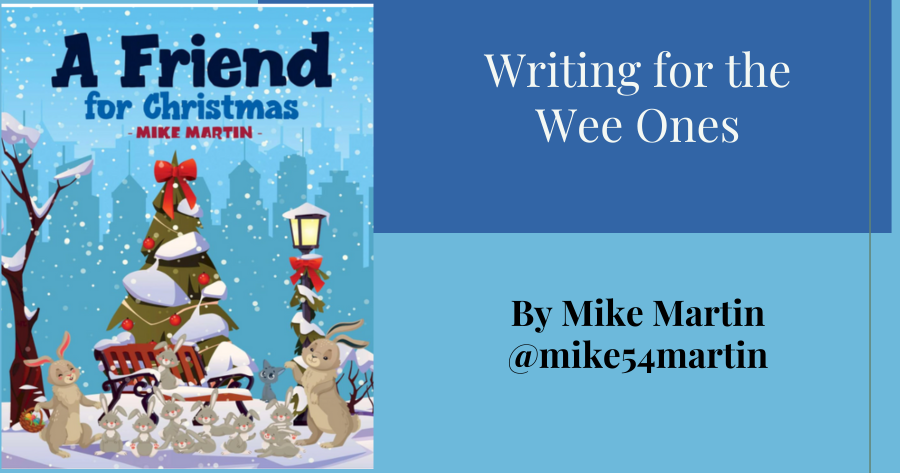by Mike Martin, @mike54martin
What’s different about writing for children than for adults? I hadn’t thought about that until recently when after 13 books in the Sgt. Windflower Mystery series I ended up with two children’s Christmas books. How did that happen anyway?
Maybe I’ll start with what’s the same about writing, no matter what the age. To my mind at least, it is always about the story. Characters and theme and plot and story arc are important, but ultimately it is about telling stories. Stories that have enough depth and weight to them to be interesting to readers. They have to be engaging and interesting so that people, of any age, will want to sit and read or listen to them.
Secondly, and this is just my preference, I prefer to write about positive things. Finding and keeping happiness. Dealing with life on life’s terms but not getting stuck in the muck. Speaking of muck, I don’t like much of it. I prefer to write and read clean literature. It can deal with mature issues; I do write murder mysteries and sometimes kill people after all. But I choose my erotica to be personal and my swear words to be private.
Both of those latter terms helped when I made the shift, at least temporarily, to the children’s side of the aisle. I don’t have to censor my thoughts or add another filter. I already have a handle on that stuff. Plus, I think that most of what ends up in books as salty real-life dialogue is just for dramatic effect versus artistic endeavour.
What about writing children’s stories? What’s different? A whole lot actually. I find it’s somewhat easier to write for children. Mostly, because you don’t have to convince them that an animal can talk. Why couldn’t rabbits or beavers or cats talk? Children are open to the possibilities, especially younger ones. That’s before we teach them rational thought and not to believe everything that people tell them.
The two biggest things about writing a book for children in my opinion are that we shouldn’t deliberate scare or frighten them, and that they should always, always have a happy ending. The world is scary enough for small people. And if there really is something that should be afraid of, like crossing a busy street, we teach them to look both ways before crossing. And we try and get through the sometimes-scary parts quickly, so they see that they can be brave and do that too.
All of my other suggestions are optional, but the happy ending is mandatory. I envision parents and grandparents sitting and reading to or with their wee ones Probably at the end of the day when everyone is getting a little sleepy, and it’s time for dreamtime. A nice happy and positive ending brings a glow to their hearts, and everyone can rest, relax and go to sleep peacefully.
The best words I could hope to hear from wee ones would be: “Poppy or Nanny, that was a good story.”
 Mike Martin is normally the author of the best-selling Sgt. Windflower Mystery series. But now he is also the author of two Christmas books. The latest is A Friend for Christmas. Available on Amazon everywhere.
Mike Martin is normally the author of the best-selling Sgt. Windflower Mystery series. But now he is also the author of two Christmas books. The latest is A Friend for Christmas. Available on Amazon everywhere.
Writing for Children After Writing for Adults by @mike54martin: Share on X

Life is crappy enough – let kids be kids and enjoy a happy ending.
Personal and private – that's how I view sex scenes and swear words as well.
Absolutely agree. Let kids be kids
Thanks so much for this great post, Mike! I totally agree with you; keeping the magic alive for them is vital.
Thank you for hosting me, Elizabeth
Hi Elizabeth and Mike – I so agree with your sentiments about being positive … also writing with your voice – a natural, normal voice … one can easily express the views being written about with the delivery by the reader – be it an older child, using her imagination … which would have emanated from her tot-hood! Thanks for this … interesting to read about – cheers Hilary
Thank you, Hilary
I agree that picture books have to end with happy endings. And I agree that writing for kids is different than writing for adults. Many writers are branching out and writing for different age groups these days. Glad you enjoyed writing your picture books.
Thank you, Natalie
It is ultimately about the story and characters, no matter what the age.
Totally agree
Thanks for this interesting perspective! There are differences between the way young readers approach reading, and the way adult readers do. And to be honest, I give all credit to writers who reach out to young readers. If the reading habit is established early in life, it's so much more likely that a person will be a lifelong reader. And educational research has shown for years that children read more often and read with more skill if they have reading material that appeals to them. That's why I have so much respect for those who write children's books that really draw them in.
Thank you, Margo
Agreed – happy endings are mandatory!
I like kids' books that are happy and fun and silly and full of joy!
Thank you, Jemi
I think children's books are the hardest to write. They have zero attention span, so you have to be a word master to pull them in and keep them in.